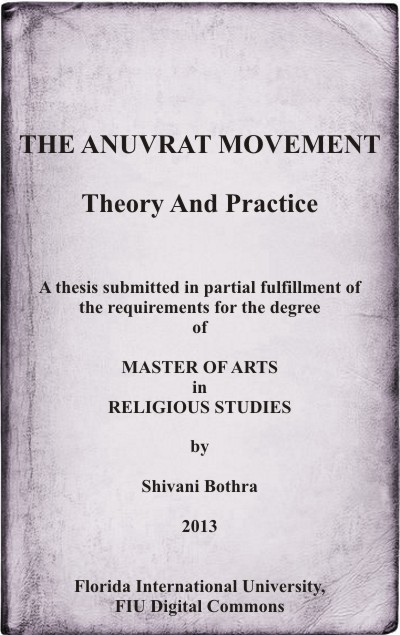Many of the concerns related to violence are relevant not only India, but in the United States, as demonstrated in the two incidents of December 2012. One is the gang rape that took place in India and the other is the example of the gun culture and the massacre of twenty innocent children and their six teachers in Newtown, USA. Such incidents are perceived as the negative consequences of modernization and globalization.
The question that I will now explore is whether the Jains in diaspora view these contemporary problems from a different perspective than the Jains that I interviewed in India. I made three central observations about the Jains I have met in the United States. Firstly, I noticed that they come from a higher socio-economic class than many of the Jains in India. Secondly, they more often placed a greater emphasis on education and the need for open-mindedness. Thirdly, I observed that many of our conversations touched on the process of creating new identities as "American-Jains," and they were very conscious of how this new identity may differ from their Jain identity in India.
For example, some of my interviewees thought that the wording of Tulsi's vows was too old-fashioned and that the Jains in the West incorporate more modern ideas in their practices than do the Jains in India, so some of these vows are not suited to the western context. For example, one respondent said: "Dowry is not a social evil in this country."[120]There was much similar consensus agitation, female feticide, dowry, business rectitude and sectarian frenzy which to them seemed specific to India. Many of my respondents reported feeling that they are much better off in the United States than their counterparts in India.
Anne Vallely, a prominent scholar of Jainism, characterizes the views of second-generation American Jains as follows: "They reject the social dimensions of the tradition and espouse a universalistic, modern interpretation. They emphasize the values of vegetarianism, animal rights, environmentalism, meditation and non-sectarianism and actively promote interfaith activities."[121] I agree with her assessment and found that many of my respondents wished to discuss the ways in which these values were important to them in formulating a distinct American-Jain identity
Vegetarianism
In my interviews, I inquired whether, a modern diaspora movement should make vegetarianism a requirement or not. Vegetarianism is a requirement for being a Jain, but how should it apply to non-Jain Anuvratis? The following response from a samani (liberal-nun) addressed my question. She said: "Anuvrat is concerned with basic human values. It does not expect people to give up their culture, tradition or religion."[122] She meant that being a vegetarian is not a strict criterion for the movement. It seems that Terapanth's drive to transcend religious and geographical boundaries significantly influenced their view in favor of allowing non-vegetarians' to participate.
It was interesting to note that many lay Jains in the United States disagreed. For example, a secondary school teacher conveyed a forceful message in favor of vegetarianism: "People used to eat meat for survival in war situations or uncivilized areas. In the present time there can be no excuse for eating meat."[123] I then asked her if she thought there should be a criterion for Anuvrati to be vegetarian. She said: "Definitely; if you do something then do it completely. Anuvrat Movement should not compromise on its core Jain principles in order to spread across the Indian boundaries."[124] The conservative view of some of the Jain diasporic members is in contrast with the liberal strategy that the movement adopts.
Environmentalism
In a recent article in Economic Times, one of India's leading business newspaper, the author poses a significant question: "How on earth will we live together sustainably and in harmony?"[125] The same article suggests adopting ways that is moral and visionary, practical and scientific. Anuvratis see Tulsi's seventh vow of setting limits to acquisition as one practical solution to the above question and the eleventh vow as dealing with issues related to the environment. The Jain scholar, Professor Christopher Chapple commented: "The ecological movement and the Anuvrat Movement are parallel; both are more about raising conscience than delivering specific results."[126] In a view expressed by one respondent in Miami, "There should be broader guidelines of the vows like not cutting trees and to what extent household could do necessary violence to rid their homes from bugs and cockroaches."[127] Such responses make clear that if the movement aspires to reach outside of India, where mostly monks and nuns do not travel, and then the vows need to be explicit and self-explanatory.
All the interviewees, without any exception, expressed the belief that Tulsi's concept of incorporating vows as part of an organized movement could still have significance in the present time. One such comment made by a Jain professor of Earth and Science is: "The significance of a great movement is its timelessness. The vows of Anuvrat are as significant today as they would be a 1000-years from now or as they were 1000 years before now. However, from an earth scientist's point of view, I feel that the vows of Anuvrati's will help in creating a more sustainable world."[128]
In the course of my fieldwork in Miami, I attended several monthly Jain Swadhaya (spiritual reading) meetings of two groups. Interested Jain members periodically gather in one member's house for a social get-together dinner followed by a spiritual discourse from the Samanis. I noticed that even though none of the members were Anuvrati, they were still trying to consciously follow eco-firendly practices. In the manner that one group, with an average of 50 members, does not use any disposables for serving while the other group, with an average of 15 members, uses disposable plates, bowls, and glasses. Observing this different pattern, I inquired upon the reasons from the two groups. The wife of my respondent from the bigger group, which did not use disposables said: "For our little convenience, it is appalling to be a part of the environmental hazard by using disposables plates and glasses." On my similar question to the other much smaller group, one member commented: "We use disposable not just for convenience, but also to save a lot of water from being used while cleansing in a dishwasher."[129] The responses reflect that their intentions could be similarly positive but the latter action, while perhaps well intentioned, actually has much more negative environmental impact than the other. Clearly much more focused education is needed to make these vows effective in addressing ecological concerns.
Meditation
Abstaining from drugs and alcohol was a major aspect of the Anuvrat Movement in India, and Preksha Meditation was proposed as a way of addressing the problem of addiction. Knowing this, I sought to explore amongst my respondents how they viewed these issues in the United States. I was informed that first generation Jains are very much connected to their home country; they keep enforcing Indian Jain culture and cultivate values by actively discussing and periodically taking their children to Pathshala.[130] Although children are introduced to Jain values, there is still concern amongst the parents about the threat of possible addictions.
Many respondents voiced concerns discussed in the previous chapter the physical and mental harm of consuming these substances is markedly similar across the national boundaries. One respondent in India asked me, "Tell me which country is not facing the problems of violence in all its manifestations as an outcome of the increasing problems of intoxications, alcoholism and addictions."[131] Such consumables are legal or illegal in the United State depending on the state, but according to the movement, undertaking a vow raises one's consciousness about the dangers they pose. Meditation is emphasized by Jain diaspora as being an important value, and my respondents were very aware of Mahapragya's promotion of Preksha Meditation as a technique with potential to help aspirants in renouncing such intoxicants.
 Shivani Bothra
Shivani Bothra
